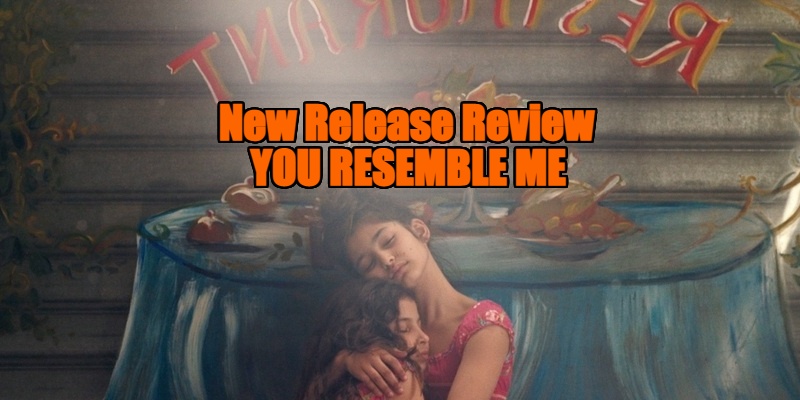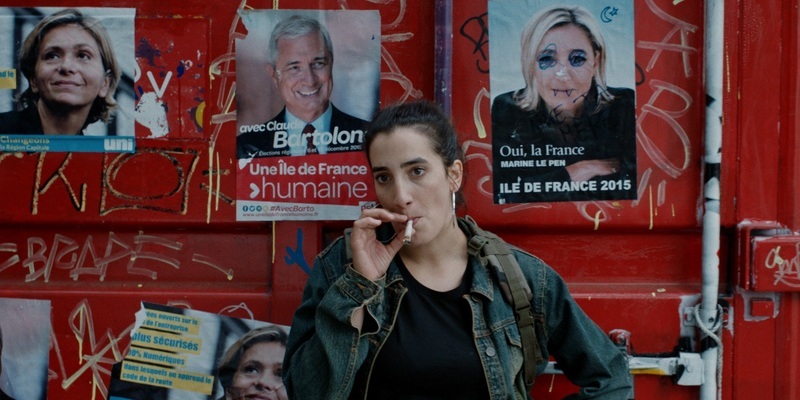
Review by
Benjamin Poole
Directed by: Dina Amer
Starring: Lorenza Grimaudo, Ilonna Grimaudo, Mouna Soualem, Sabrina Ouazani, Dina Amer

Part of my day job involves volunteer work with young people. Rewarding
graft, yes, but also edifying in that you get a sense of what's going on
with dem youth: the new trends, the latest fashions etc. Who's in and who
the fuck's out, and at the moment, the big name on everybody's lips is
some bean headed rapist jailed in Romania who had hitherto set himself up
as a lifestyle guru for the gullible and feeble of mind (to avoid adding
to the profile I'm not typing their name - you know who I'm on about, and
if not just google "smalldickenergy"). And by everybody, I mean of course
adolescent boys, with all their attendant insecurities and pubescent
anxieties. It's all you hear; an almost unanimous, unthinking fealty to
this absolute clown. He’s a "nice guy looking out for his bros" (lol).
He's the "Top G" (cringe). He's jailed because "the authorities" want to
keep him down (jfc, kid). The attitude of some of these boys towards their
female counterparts has demonstrably changed, too, and you worry also how
far the unseen influence goes, and where it will ultimately lead to.
"Something Must Be Done" people flap, which usually ends up as impotent
proposals to regulate internet access. I'm not so sure myself - censure
will only embiggen smalldickenergy's constructed outlaw status. Also, this
sort of radicalisation (not too strong a word) can only ever tap into a
pre-existing malaise: the contemporary worries of teen boys are being
assuaged, and they are seemingly being told what they really, really want
to hear. The rot is deep. Mind you, it was only a few years ago they were
all gaga about fidget spinners, which they then suddenly tired of after a
couple of months...

The fad is instructive. It tells us that this sort of cult affiliation,
this indoctrination, is in no way particular to any one culture. That
moral relativism, low self-esteem and the sensation of being side-lined in
one's own society, and the extreme mindsets which such perceived
relegation leads to, is a universal contention. Which [spoilers ahead, if
you want to go in completely cold] leads us to
You Resemble Me, the startling debut feature from Dina Amer (with writing duties
shared by Omar Mullick), a thoughtful and humane study of true-life
radicalisation.
We follow the story of Hasna and Mariam, two little French-Moroccan kids
growing up in marginalised poverty in Paris. Listen, I love the French,
with their yellow headlamps, Isabelle Hupperts and elevation of cinema to
an artform but their urban slums really are some of the grimmest on
screen. None of the cosy, chunky brutalism of the British council estates;
the high rises here are washed out concrete and hard isolation. Not that
this bothers Hasna and Mariam, who dress each other in colourful frocks
which contrast their pale surroundings, and dance about the streets in
intuitive defiance of their restricted environs. However, their mum is
violent and ill-equipped for her role, and, after the girls running away
and Hasna telling all to the Gendarmes, social services intervene and the
girls are taken away from home, split up and placed within different
families.

Amer positions this incident as the first step towards little Hasna
becoming the adult Hasna Aït Boulahcen, who was reported as a suicide
bomber in Saint-Denis in the aftermath of the November 2015 Paris attacks.
Following these early presentations of Hasna's alienation we cut forward
15 or so years, where Hasna is now a street sex worker and drug addict.
The time switch happens after a scene suggesting Hasna's rape as a child
and continues to be necessarily unpleasant. Previously a journalist, one
imagines that Amer's representations are duly researched, and that the
sexual exploitation and abuse we see Hasna experience at the hands of men
has grounding in actual events. I'll tell you something: it made me angry
and want to see the perpetrators suffer, and suffer a lot, and I'm just
sat there watching it from a safe distance. Mouna Soualem's
portrayal of Hasna is instrumental to the emotional engagement
You Resemble Me engenders. In one of the performances of the
year, Soualem is completely riveting, explicating how Hasna is a
consequence of her environment.
As each card falls, Hasna's mental state and desperation is convincingly
relayed: her sex work past interferes with legitimised employment, there
is lingering prejudice concerning her class, and more upfront bigotry
regrading her ethnicity. A consistent motif throughout the film is one of
dressing up, of transformation, from the clothes the little sisters wear,
to the cowboy hat Hasna clings to throughout her life, to the enforced
straightening of her hair. In the paranoid des rues of
You Resemble Me, identity is either weaponised or suppressed. Accordingly, the film
suggests that Hasna's affiliation with ISIS is little to do with religion
or even ideology. Instead, the sect offers Hasna something which her
present social context actively discourages: self-esteem and a sense of
purpose.

In an atomised society, in which various interested parties have divided
us in order to conquer, you fret that extremity could become the mode du
jour, a concern stoked this last month by the stubborn celebration of a
jailed alleged rapist, and every other day by the consistent and seething
anger of social media. In this assured debut, there are occasional
missteps that threaten the otherwise chilling plausibility, chiefly in the
presentation of the bourgeois family who foster Hasna. For some reason,
they serve the Muslim Hasna a non-festive pork for Christmas dinner and
the dad pointedly reads Charlie Hebdo: in a film where characterisation is
otherwise subtly inexorable, the wilful ignorance of the family doesn't
convince. A quibble, as You Resemble Me is a film everyone
should see, not just for its carefully constructed drama, but its
uncomfortably urgent implications.

You Resemble Me is in UK cinemas
and on VOD from February 3rd.

